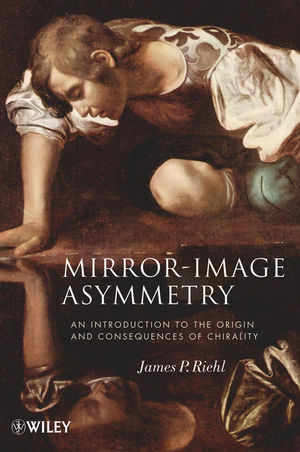
Mirror-Image Asymmetry
John Wiley & Sons Inc (Verlag)
978-0-470-38759-7 (ISBN)
- Titel z.Zt. nicht lieferbar
- Versandkostenfrei innerhalb Deutschlands
- Auch auf Rechnung
- Verfügbarkeit in der Filiale vor Ort prüfen
- Artikel merken
An overview of the importance and consequences of asymmetry from molecules to the macroscopic world As scientists have become more capable of probing the structure of three-dimensional objects at the molecular level, the need to understand the concept and the consequences of mirror-image asymmetry—chirality—has increased enormously. Written at an introductory level, Mirror-Image Asymmetry provides an overview of the importance and effects of asymmetry from the atomic and molecular world of physics and chemistry to the organisms and structures that we see and use in our everyday life. The reader will develop a broad appreciation of three-dimensional asymmetry from the microscopic molecular world to the macroscopic world of handedness, automobile driving, windmills, sports, and similar phenomena. The book features:
An introduction to basic definitions and the nomenclature of asymmetric and dissymmetric molecules
Up-to-date examples of the importance and consequences of asymmetry in modern drug applications, current theories of the origin of asymmetry in nature, and examples of molecular asymmetry in smell, taste, and insect communication
Many illustrations, chemical structures, and photographs that enable the reader to connect the actual asymmetrical structures to the different phenomena that depend on structural asymmetry
In the 150 years since Louis Pasteur discovered asymmetry in molecular structures, scientists have made great progress in understanding how interactions between chiral molecules influence biochemical processes. This knowledge is leading to very sophisticated asymmetric synthetic techniques that have greatly benefitted many research groups especially those in the pharmaceutical industry. This guide to the role of molecular and macroscopic chirality will inspire students and scientists in chemistry, biology, physics, and drug discovery.
JAMES P. RIEHL received a BS degree in chemistry from Villanova University in 1970 and a PhD in physical chemistry from Purdue University in 1975. He is currently Dean of the Swenson College of Science and Engineering and Professor of Chemistry at the University of Minnesota Duluth, a position he has held since 2000. Dr. Riehl is a frequent invited speaker nationally and internationally on the topic of molecular chirality, and is the author of numerous research publications in the applications of optical spectroscopy to the study of chiral structures. He was the recipient of the St. Louis Award of the American Chemical Society for his outstanding contributions to the chemistry profession, and currently holds a University of Minnesota McKnight Presidential Leadership Chair.
Preface xi
List of Figures and Biographic Photographs xv
1 The Mirror Image 1
Handedness 2
The Symmetry of Nonsuperimposable Mirror Images 5
Nomenclature for Chiral Molecules 11
Nomenclature for Dissymmetric and Other Chiral Molecules 19
Summary 24
Suggestions for Further Reading 24
References 25
List of Biographic Photographs, Sidebars, and Figures 25
2 Molecular Chirality in Living Systems 27
Optical Rotation 30
From Biot to Pasteur 36
Biochemical Homochirality 44
Determination of Absolute Structures of Chiral Molecules 52
Summary 54
Suggestions for Further Reading 55
References 55
List of Biographic Photographs, Sidebars, and Figures 56
3 The Origin of Chirality in Living Systems 59
Must Life be Chiral? 60
Mirror-image life? 62
The Origin of Homochirality in Living Systems 63
Extraterrestrial Chirality 65
Nuclear Chirality 70
Other Extraterrestrial Sources 72
The Beginning of Life on Earth: Biochemistry 73
Getting Started in the Right (or Left) Direction 76
Summary 78
Suggestions for Further Reading 78
References 79
List of Sidebars and Figures 80
4 Chiral Chemistry, Recognition, and Control in Living Systems 81
Chiral Chemical Evolution 81
Chiral Recognition at the Molecular Level 83
Examples of Chiral Recognition and Discrimination 87
Smell 87
Taste 91
Communication 93
Chirality as a Control Mechanism in Biochemistry 104
Summary 108
Suggestions for Further Reading 108
References 108
List of Biographic Photographs, Sidebars, and Figures 110
5 Chirality and Drugs 111
Chirality in Natural Remedies and Folk Medicines 112
Enantiomeric Differences in Natural Products 114
Thalidomide and Regulation of Chiral Drugs 118
Chirality and Drug Activity 121
Ibuprofen 121
Prozac 122
Cialis 123
Nexium 125
Lipitor 128
Chiral Switching 129
Ephedrine, Pseudoephedrine, and Methamphetamine 131
Preparation of Pure Enantiomers 135
Summary 143
Suggestions for Further Reading 143
References 143
List of Biographic Photographs, Sidebars, and Figures 145
6 The Chirality of Living Systems 147
Preliminary Cautions 148
Chirality in Nature 153
Classification of Plant and Animal Chirality (Asymmetry) 159
Symmetric Life 160
Racemic Life 160
Asymmetric Life 162
Homo sapiens Asymmetry 170
Summary 171
Suggestions for Further Reading 171
References 172
List of Sidebars and Figures 173
7 The Handedness of Homo sapiens 175
Are You Right-Handed or Left-Handed? 176
The Statistics of Handedness 178
The Origin of Left-Handedness 183
The Human Genetics of Handedness 186
Summary 192
Suggestions for Further Reading 193
References 194
List of Sidebars and Figures 195
8 Living in a Right-Hander’s World 197
Clockwise and Counterclockwise (or Anticlockwise) Rotation 198
Helical Stairways 201
Around the House 204
Making Music Left-Handed 205
The Chirality of Writing 207
Sports and the Left-Hander 210
American Baseball: The Chiral Sport 216
Driving on the Left or Right Side 221
Windmills 224
Summary 227
Suggestions for Further Reading 228
References 228
List of Sidebars and Figures 228
9 The Asymmetric Universe 231
List of Figures 234
Appendix 235
Biography 239
Index 241
| Erscheint lt. Verlag | 9.4.2010 |
|---|---|
| Verlagsort | New York |
| Sprache | englisch |
| Maße | 158 x 235 mm |
| Gewicht | 399 g |
| Themenwelt | Naturwissenschaften ► Biologie |
| Naturwissenschaften ► Chemie ► Allgemeines / Lexika | |
| Naturwissenschaften ► Chemie ► Physikalische Chemie | |
| ISBN-10 | 0-470-38759-9 / 0470387599 |
| ISBN-13 | 978-0-470-38759-7 / 9780470387597 |
| Zustand | Neuware |
| Haben Sie eine Frage zum Produkt? |
aus dem Bereich



